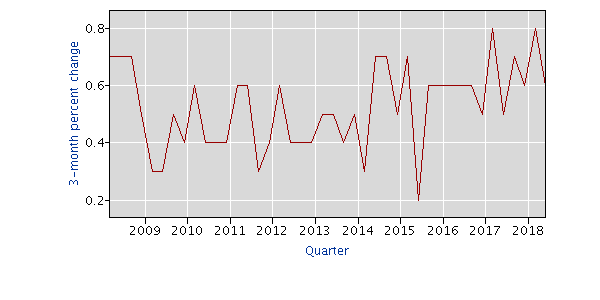July 31, 2018
When I saw the Bureau of Labor Statistics’ Employment Cost Index (ECI) numbers for the second quarter this morning, I sent a note to some friends joking about how wage growth is skyrocketing, in the sense that it isn’t. The report showed compensation rose 0.6 percent in the second quarter, this is actually a modest slowing from prior quarters.
As a practical matter, the numbers are erratic enough and the changes are small enough, that I wouldn’t necessarily argue that wage growth has slowed based on the new ECI data, but the key point is that it sure does not look like it is accelerating. Here’s picture over the last decade.
Employment Cost Index: Total Compensation

Source: Bureau of Labor Statistics.
Given what the data showed I was surprised to find a tweet from Donald Trump announcing “worker pay rate hits highest level since 2008.” It turns out this was actually the headline of a CNBC piece touting the 2.8 percent year over year growth shown in the ECI.
While Donald Trump’s confusion with the data is hardly surprising (we know he has trouble with numbers), the CNBC piece is more than a bit off the mark. First of all, it would be useful if it could distinguish rates of growth from levels. Wages and compensation are virtually always rising, which means they set new highs every month and quarter.
The headline should have indicated that this was the fastest rate of increase since 2008. Also, this was not just a problem of a confused headline writer, the first sentence of the piece tells readers:
“Compensation for workers rose to a nearly 10-year high in the second quarter as inflation pressures continued to percolate in the U.S. economy.”
Interestingly, the very next sentence gives the new data showing the slowdown in compensation growth to 0.6 percent in the quarter, although it never points out this is a slowing, instead highlighting the increase in the twelve-month growth rate to 2.8 percent, even as the new data actually goes in the opposite direction.
It also would have been useful to note that even this twelve-month rate of compensation growth does not imply any increase in workers’ real pay, as inflation over this period was also 2.9 percent. In short, this tweet from Donald Trump, like most of his tweets, didn’t make much sense, but at least, in this case, he could blame the error on someone else.







Comments